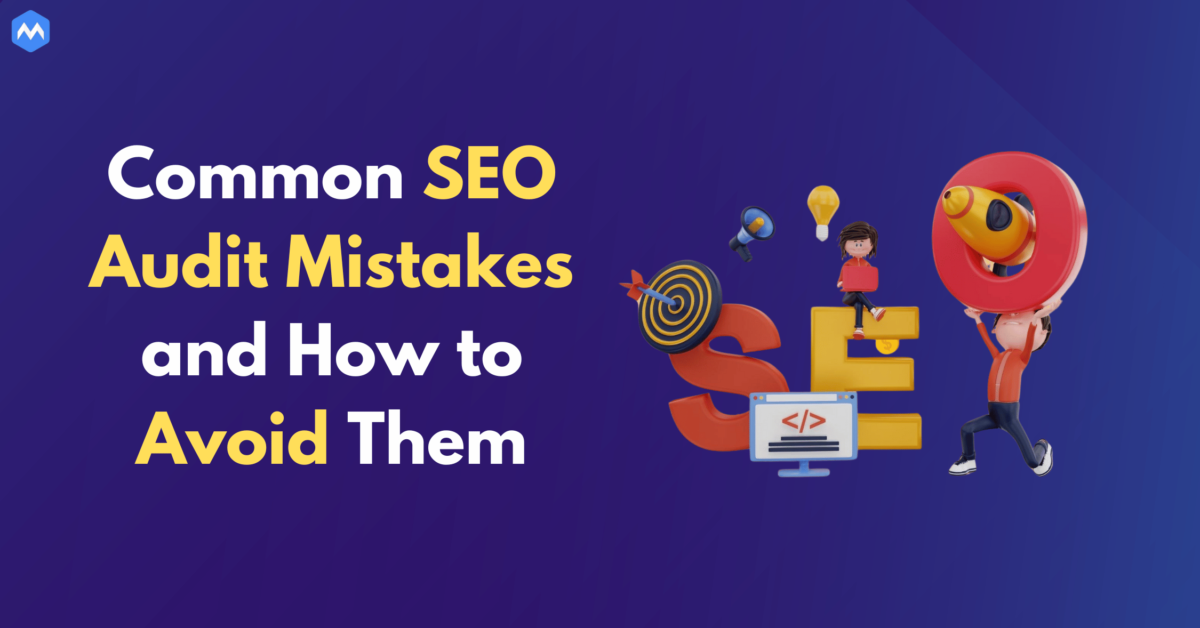Common SEO Audit Mistakes and How to Avoid Them
Introduction:
Have you ever made a common SEO mistake?
Possibly Yes!
So, trial and error is always part and parcel of the SEO journey, and meanwhile, this is not as easy as it sounds. Paying attention to the details when optimising for search engines can benefit any website. However, there is a lot of discussion and confusion around what exactly plays a crucial role in appearing on search engine pages.
With so much information available, it’s easy to miss making fundamental mistakes that can potentially harm your ranking. We’ve compiled this information, which covers some common SEO blunders as well as provides tips on how you can avoid them. Here are common SEO audit mistakes to avoid if you want to improve your search engine results.
Neglecting Technical SEO:
One of the most common SEO mistakes during SEO audits is neglecting technical SEO elements. Technical SEO involves optimizing the technical aspects of a website to improve its crawling, indexing, and overall performance. Ignoring technical SEO can lead to poor search engine rankings and user experience.
To avoid this mistake, ensure that your SEO audit checklist includes a thorough review of technical aspects such as website speed, mobile-friendliness, URL structure, and crawl errors. Use tools like Google PageSpeed Insights and Google Search Console to identify and address technical issues.
Overlooking On-Page SEO:
On-page SEO is a critical factor in search engine rankings, and neglecting it during an audit can be detrimental. Common on-page SEO mistakes include missing or duplicate meta tags, inadequate keyword optimization, and poor content quality.
To avoid on-page SEO issues, conduct an in-depth analysis of each page’s meta tags, headers, and content. Use tools like SEMrush or Ahrefs to find keyword gaps and optimize content for relevant keywords. Make sure that the content is valuable and easy to read.
Spending Less Time Choosing Keywords (an SEO Mistake that Delays Organic Progress)
The next item on the list of very common SEO mistakes is choosing and using the wrong keywords within your site’s content.
You can’t be a stranger to the fact that search engine ranking depends on the keywords evenly distributed through the content in the right numbers.
The chosen keywords and the content frequently don’t work well together. This is the reason why search engines are not ranking content higher. So, to overcome this shortcoming, identify the exact keyword by following the keyword research best practices.
Then, check if those chosen keyword phrases are distributed evenly throughout the content. And, to rank higher, it is generally advisable to use keywords in the title and the first paragraph of your content.
Also Read: Mastering On-Page SEO Techniques: A Comprehensive Guide
Ignoring Content Quality and Relevance:
Quality content is at the heart of SEO success. Unfortunately, some website owners overlook the importance of high-quality, relevant content during audits. Thin content, keyword stuffing, and outdated information can negatively impact a site’s SEO performance.
To avoid content-related SEO audit mistakes, perform a content audit to identify low-quality or outdated pages. Invest in creating valuable, informative, and engaging content that aligns with user intent. Regularly update content to reflect industry changes and ensure it remains relevant to your audience.
Careless with Content (the Most Common On-Page SEO Mistake)
Doing SEO for text-based content can be a bit difficult and tricky at times. This is because all your competitors will be doing every website and blog in the same way. Thus, it’s wise to concentrate on producing original content if you want to stand out in your niche.
Aside from this, there are other content formats that you need to concentrate on too. Thus, this is not just about changing your meta description; optimising the entire content is inevitable.
You should also focus on your meta title, meta descriptions, internal and external links, and images in addition to title tags. This helps you rank higher on Google and drive organic traffic to your website.
Such common SEO mistakes can be eliminated by analysing the format of other content that many people prefer these days.
Disregarding User Experience:
User experience (UX) plays a significant role in SEO, as search engines aim to provide users with the best possible results. Ignoring UX during an SEO audit can result in high bounce rates and lower search rankings.
To address UX issues, assess website navigation, page loading speed, and mobile responsiveness. Optimize images and implement lazy loading to improve page speed. Ensure that the website is easy to navigate and provides a seamless experience across different devices.
Failing to Conduct Competitor Analysis:
Competitor analysis is an essential part of any effective SEO strategy. However, some website owners overlook this aspect during audits, missing valuable insights into industry trends and competitor strategies.
To avoid this mistake, include competitor analysis in your SEO audit process. Identify your main competitors, and analyze their backlink profiles, keyword strategies, and content. Use this information to identify opportunities and refine your SEO strategy.
Neglecting Backlink Analysis:
Backlinks remain a crucial factor in search engine algorithms, but many audits need to pay more attention to the quality and relevance of a website’s backlink profile. Spammy or low-quality backlinks can undermine SEO efforts.
Use tools like Moz or Ahrefs to analyse your backlink profile to avoid backlink-related mistakes. Identify and disavow toxic backlinks, and focus on building high-quality, relevant links through outreach and content marketing strategies.
Not Monitoring Analytics and Metrics:
Some website owners perform SEO audits without analyzing the impact of their efforts. Failing to monitor analytics and key metrics can result in missed opportunities for improvement.
To avoid this mistake, regularly review website analytics, including organic traffic, conversion rates, and keyword performance. Use these insights to measure the success of your SEO strategy and make data-driven decisions for continuous improvement.
Unaware of White-Hat SEO and EAT (the Biggest SEO Mistakes)
Search engine optimisation is not all about ranking higher on Google’s SERP. It’s about building a reputable brand.
Yes! The big G is always partial and only favours sites that are real, trusted, and outstanding.
Google’s E-A-T theory stands for expertise, authority, and trust.
Additionally, Google defines the EAT of every website by using a combination of various data points and algorithms.
So how do you get on the good pages of Google?
- Confirm your expertise, authority, and trustworthiness.
- Make sure the goal of your SEO strategy is not to increase your ranking but to increase your brand’s visibility.
Many try to manipulate the search engine algorithm with black-hat SEO tricks to gain quick results.
On the contrary, you will no longer even appear in the search engine results.
So, of all common SEO audit mistakes, following unethical practices just to rank at the top of Google’s SERP is never encouraged but heavily penalised by Google.
Conclusion:
A successful SEO audit requires a comprehensive approach that addresses technical, on-page, content, user experience, competitor analysis, backlinks, and analytics. By avoiding common SEO audit mistakes in these areas, website owners can enhance their SEO efforts, improve search rankings, and drive sustainable organic traffic. Regularly updating and refining your SEO strategy based on audit findings will contribute to long-term success in the ever-evolving digital landscape.
Let Metaloop Marketing worry about all that for you. We are a full-service digital marketing company that produces results, offering everything from SEO to content to paid search services and more. Get in touch with our experts and request a comprehensive site health audit today!



Write a Comment